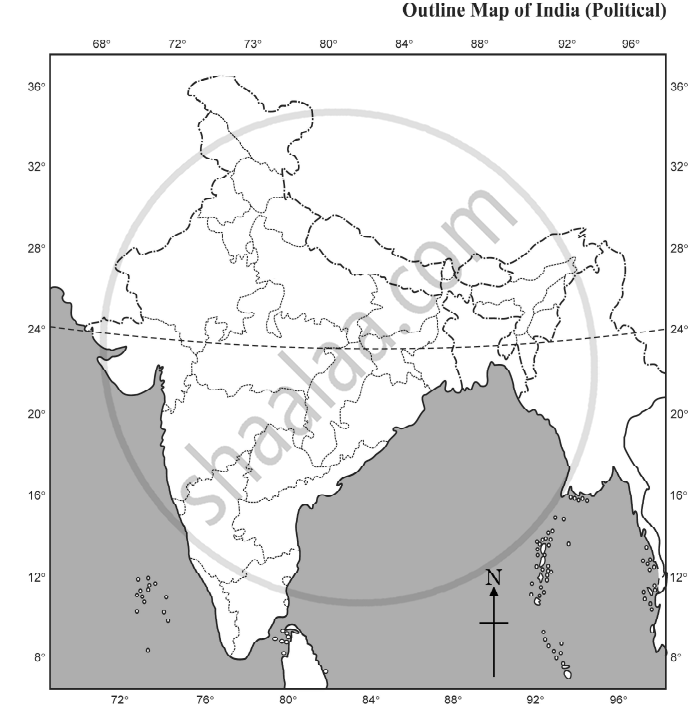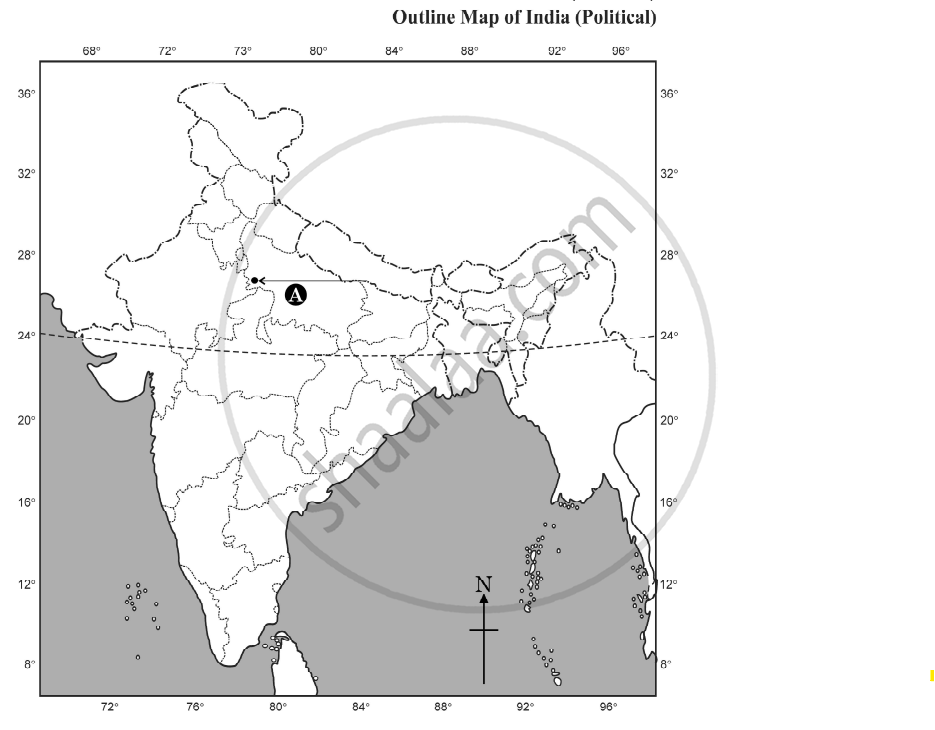Commerce (English Medium)
Science (English Medium)
Arts (English Medium)
Academic Year: 2021-2022
Date & Time: 10th June 2022, 10:30 am
Duration: 2h
Advertisements
General Instructions:
Please read the following instructions carefully and strictly follow them:
- This question paper contains 10 questions. Marks have been indicated against each question.
- All questions are compulsory.
- This question paper is divided into FOUR Sections - Section A, B, C and D.
- Section A - Question Nos. 1 to 4 are Short answer type questions of 3 marks each. Answer to each question should not exceed 80 words.
- Section B - Question Nos. 5 to 7 are Long answer type questions, carrying 6 marks each. Answer to each question should not exceed 150 to 200 words.
- Section C - Question Nos. 8 and 9 are Case Based questions, carrying 4 marks each.
- Section D - Question No. 10 is MAP based question, carrying 2 marks.
- There is no overall choice in the question paper. However, an internal choice has been provided in some questions. Only one of the choices in such questions have to be attempted.
Explain the ideas of R.V. Dhulekar on the issue of National language in the Constituent Assembly.
Chapter:
Describe the importance of the writings and speeches of Gandhiji and his contemporaries as important sources to know about the Indian National Movement.
Chapter:
Explain the circumstances under which the rebels of 1857 acquired legitimacy from Bahadur Shah Zafar.
Chapter:
Analyse the impact of the ‘policy of pacification’ on the Paharias, proposed by Augustus Cleveland in 1780.
Chapter:
Examine the economic conditions of the Paharias after the settlement of Santhals in the periphery of Raj Mahal Hills.
Chapter:
Advertisements
Describe how the British Raj was shaken to its foundation as a consequence of the Non-Cooperation Movement.
Chapter:
“The process of manuscript production in the Mughal Court involved a number of people performing a variety of tasks.” Support the statement with examples.
Chapter:
“Chronicles commissioned by Mughal Emperors are the important sources for studying the empire and its court.” Explain the statement with examples.
Chapter:
“Chain of grievances of taluqdars and peasants led them to join the revolt of 1857.” Elucidate the statement.
Chapter:
Advertisements
“There were not only rumours but sound bases which led the people to revolt in 1857.” Explain the statement.
Chapter:
Read the source given below and answer the questions that follow.
|
“There cannot be any divided loyalty” Govind Ballabh Pant argued that in order to become loyal citizens people had to stop focusing only on the community and the self: For the success of democracy one must train himself in the art of self-discipline. In democracies, one should care less for himself and more for others. There cannot be any divided loyalty. All loyalties must exclusively be centred around the State. If in a democracy, you create rival loyalties, or you create a system in which any individual or group, instead of suppressing his extravagance, cares nought for larger or other interests, then democracy is doomed. |
- Examine the concern of Gobind Ballabh Pant for a Unified Nation. (1)
- Why was loyalty considered as an important attribute of social pyramid? (1)
- Analyse the aspects considered significant for the success of democracy. (2)
Chapter:
Read the case given below carefully and answer the questions that follow:
|
The accessible emperor In the account of his experiences, Monserrate, who was a member of the first Jesuit Mission, says: It is hard to exaggerate how accessible he (Akbar) makes himself to all who wish to be the audience of him. For he creates an opportunity almost every day for any of the common people or of the nobles to see him and to converse with him, and he endeavours to show himself pleasant-spoken and affable rather than severe towards all who come to speak with him. It is very remarkable how great an effect this courtesy and affability has in attaching him to the minds of his subjects. |
- Examine the impact of Akbar’s accessibility on the minds of his subjects. (1)
- Why did Akbar invite Jesuit Mission to his court? (1)
- How did Akbar use to facilitate meetings for those who wanted to call on him? (2)
Chapter:
On the given political outline map of India, locate and label the following with the appropriate symbol:

(a) The place where mutiny started in 1857.
OR
(b) The place where Gandhiji broke the Salt law.
Chapter:
On the given political outline map of India, a place related to Capital city of the Mughal Empire has been marked as A. Identify it and write its name on the line drawn near it.

Chapter:
Other Solutions
Submit Question Paper
Help us maintain new question papers on Shaalaa.com, so we can continue to help studentsonly jpg, png and pdf files
CBSE previous year question papers Class 12 History with solutions 2021 - 2022
Previous year Question paper for CBSE Class 12 History-2022 is solved by experts. Solved question papers gives you the chance to check yourself after your mock test.
By referring the question paper Solutions for History, you can scale your preparation level and work on your weak areas. It will also help the candidates in developing the time-management skills. Practice makes perfect, and there is no better way to practice than to attempt previous year question paper solutions of CBSE Class 12.
How CBSE Class 12 Question Paper solutions Help Students ?
• Question paper solutions for History will helps students to prepare for exam.
• Question paper with answer will boost students confidence in exam time and also give you an idea About the important questions and topics to be prepared for the board exam.
• For finding solution of question papers no need to refer so multiple sources like textbook or guides.
